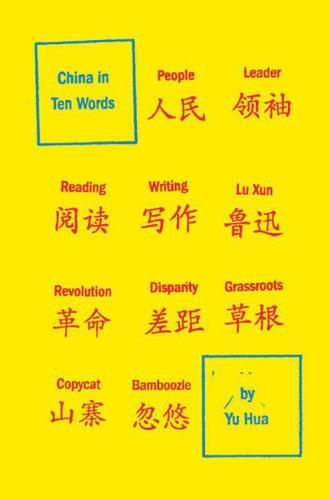
China in Ten Words
کتاب های مرتبط
- اطلاعات
- نقد و بررسی
- دیدگاه کاربران
نقد و بررسی

August 1, 2011
In these moving and elegantly crafted essays organized around 10 common terms from the Chinese vernacular, internationally acclaimed novelist Yu (To Live) looks back on his childhood during the Cultural Revolution and examines how China has changed in the decades since. Yu's first work of nonfiction translated into English, the book offers rare insight into the cause and effect of China's "economic miracle," focusing close attention on the citizens of the world's most populous country. With an intimate tone and witty prose, Yu looks at the "effects that seem so glorious and search for their causes, whatever discomfort that may entail," training his incisive eye on the quotidian as well as the grand. Chapters such as "People," "Leader," "Disparity," "Grassroots" and "Revolution" weave memoir and commentary with a clear-eyed economic, sociological, and political appraisal, taking on poverty and oppression on the small and large scale. "Writing," "Lu Xun," "copy cat," and "bamboozle" examine Chinese cultural realities, past and present, extrapolating truths about growing up, family, friendship, sexuality, literature, and morality. Yu's book describes his particular experience, but hints at something much more expansive. As he writes in "Reading," "If literature truly possesses a mysterious power, I think perhaps it is precisely this: that one can read a book by a writer of a different... culture and there encounter a sensation that is one's very own."

October 1, 2011
Acclaimed Chinese novelist Yu Hua (Brothers, 2010, etc.) offers a series of essays that combine memoir and trenchant social critique. Born in 1960, Yu Hua is of a generation that has been witness to China's astounding and perplexing economic and social transformations. While each essay is loosely themed around a common Chinese word—e.g., "People," "Leader," "Reading," "Writing"—the book reflects on the author's experiences during the Cultural Revolution of the 1960s and '70s and expresses his feelings on how China has and has not changed since then. As a boy during that time, Yu Hua was mostly bored, as there was little to do and little outside of Mao Zedong to read. Still, his stories of the cruelties and inanities of the time make clear his conclusion that the Cultural Revolution made for "a life made up of equal parts stifled instincts, dreary freedom, and hollow verbiage." For no particular reason he could discern, the Chinese government decided in 1978 that Yu Hua should be a dentist. And so he was, until his literary career took off in the '80s, just as the market economy in China took flight. His curmudgeonly conclusion is that China has entered into "an era of impulsive self-indulgence" and "moral bankruptcy and confusion of right and wrong." For Yu Hua, revolution in China never disappeared "but simply donned a different costume." The mad dash toward change remains. The author is hardly pedantic here, however, as he makes his points in sharply observed tales about everyday life. The translation preserves both his simple, direct style and subtle sense of humor. More engaging than profound, Yu Hua's essays say much about the continuing enigma that is China.
(COPYRIGHT (2011) KIRKUS REVIEWS/NIELSEN BUSINESS MEDIA, INC. ALL RIGHTS RESERVED.)

November 1, 2011
Yu is one of contemporary China's most celebrated but controversial writers. With much wit and elegance, he reminisces here in separate pieces (only one has been previously published) about his country's experiences over the past several decades, using personal stories as well as a piercing, critical examination of China's political, economic, and social transformation from what was essentially a Third World state into a superpower. Best known for his novels, e.g., Brothers, which satirize the country's moral depredation and its devolution into a hypercapitalist society, Yu chooses ten phrases--"people," "leader," "reading," "writing," "Lu Xun," "disparity," "revolution," "grassroots," "copycat," and "bamboozle"--that capture what he sees as China's most pressing issues over the last 60 years. His commentary is wide and varied, touching on everything from the country's severe economic and social disparity since the Cultural Revolution of the 1960s to his own rise from uneducated, small-town "teeth puller" to one of the most highly regarded writers of his time. VERDICT A marvelous book for those interested in contemporary China, by one of China's foremost intellectuals.--Allan Cho, Univ. of British Columbia Lib., Vancouver
Copyright 2011 Library Journal, LLC Used with permission.

October 1, 2011
It seems incongruous that the essence of a nation of more than one-billion people could be boiled down to just 10 words, and yet the challenge of doing just that is what Yu Hua embraces. An internationally celebrated novelist and the first Chinese to win the James Joyce Foundation Award, Yu Hua embarks on a cogent analysis of his country's tumultuous past three decades in essays that explore the 10 words and phrases that best sum up the Chinese experience. From the Great Leap Forward to the Cultural Revolution, the philosophies of Chairman Mao and his successors to the tragedy of Tiananmen Square, China is a nation of contradictions and anomalies, traditions and rituals that Yu Hua deciphers through candid observations and personal revelations. His love of Reading, for example, was ironically fostered by his library's limitation to the works of Chairman Mao, while his sense of Revolution was ignited by his older brother's schoolyard insolence. Introspective, provocative, persuasive, and inspiring, Yu Hua's insights into this mystifying land are refreshingly insightful.(Reprinted with permission of Booklist, copyright 2011, American Library Association.)

























دیدگاه کاربران